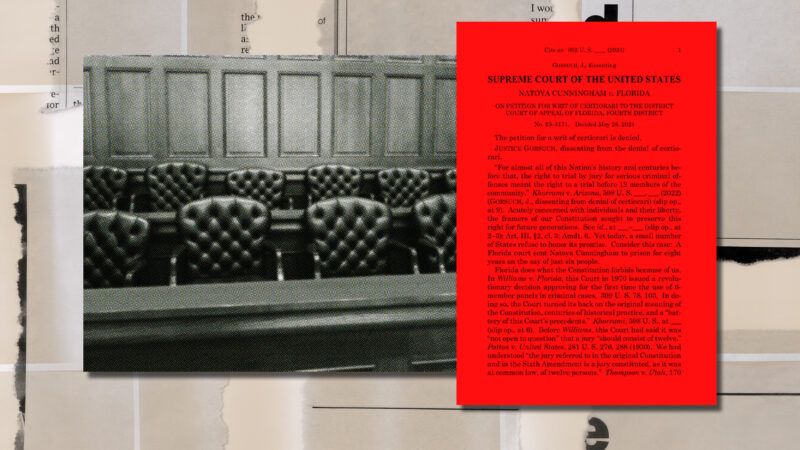'An Embarrassing Mistake': Neil Gorsuch Rails Into Florida's Use of 6-Person Juries
The Sixth Amendment was originally seen as vital to preserving liberty. Yet it has been consistently watered down.

The right to a trial by jury was designed to be part of "the heart and lungs of liberty," enshrined into the Constitution to protect people "against being ridden like horses, fleeced like sheep, worked like cattle, and fed and clothed like swine and hogs," according to John Adams.
It is, in theory, still supposed to do that. But the Founders would likely be dismayed by the ways in which the government has watered down that right since their passing.
Supreme Court Justice Neil Gorsuch rebuked one such way today: the use of six-member juries, as opposed to the historical practice of 12-person panels.
His opinion was pegged to Cunningham v. Florida, a case concerning Florida woman Natoya Cunningham who was sentenced to eight years in prison after a six-person jury found her guilty of aggravated battery and retaliation against an informant to whom her nephew sold crack. Florida is one of six states—the others are Arizona, Connecticut, Indiana, Massachusetts, and Utah—that permits either six- or eight-person panels for such criminal trials.
The Court declined to hear Cunningham's appeal. Yet it was the Supreme Court itself, Gorsuch noted in his dissent today, that greenlit governments to shrink juries in its 1970 decision Williams v. Florida, which initially approved the six-person set-up. That "revolutionary" ruling, Gorsuch said, was "an embarrassing mistake" that "turned its back on the original meaning of the Constitution" and "centuries of historical practice." The 12-person requirement had indeed been the standard for centuries prior to the high court's about-face 54 years ago.
"Pointing to academic studies, Williams tepidly predicted that 6-member panels would 'probably' deliberate just as carefully as 12-member juries," wrote Gorsuch. "But almost before the ink could dry on the Court's opinion, the social science studies on which it relied came under scrutiny." Eight years later, in Ballew v. Georgia, the Court conceded that "recent empirical data suggest that progressively smaller juries are less likely to foster effective group deliberation."
Most people today are unlikely to get a jury at all, smaller or otherwise, with the advent of mass plea bargaining. About 98 percent of federal convictions are reached with a plea deal; the same can be said for about 95 percent of convictions in state courts. Though plea bargaining is widely seen in pop culture as giving defendants a break, it is also why some innocent people end up in prison for crimes they did not commit: Prosecutors routinely overcharge defendants and hang extreme sentences over their heads, only offering to pump the brakes if the accused will agree to forego a jury trial. Some roll the dice anyway. Many do not. Why exercise your Sixth Amendment right when it could cost you your life?


Show Comments (18)